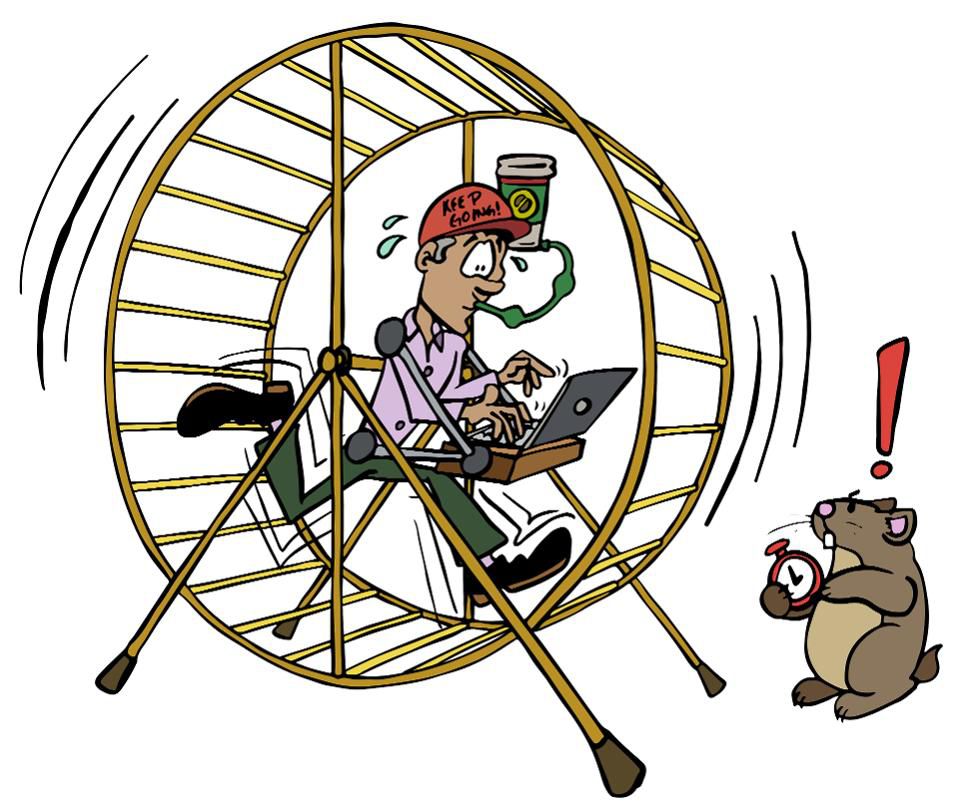There is no question that the currency of busyness is at an all-time high. Yet just as having a lot of free time does not mean you’re lazy or idle, being busy does not mean you are successful, productive or in demand. Here are some ways to test your own relationship to busyness and discover which of your mad, crazy busy colleagues and friends are in fact productive, successful and fulfilled, and who is using this hugely inflated currency simply to fool themselves and you.

You’re watching a movie. The first scenes show a man who’s leading a life of leisure. Do you assume he is:
- Obviously quite well off
- Unable to find work.
Two women are posting updates on social media. The first woman’s posts are all about how stressed she is at work. The second woman’s updates are all about her recreational activities. Do you imagine that:
- The second woman earns more than the first woman
- The first woman is way better off financially
A friend tells you he has quit his job to work part-time. Which of these statements sums up your reaction?
- My goodness, he must be doing really well to be able to afford this
- He must be struggling
If you answered 1. to all or most of these questions, you are most probably Italian or possibly Spanish, French, South American or Asian.
If you answered 2. to all or most of these questions, chances are you are American or possibly German, Dutch, British, or Danish.
100 years ago, having a lot of leisure time conferred status, even in the US. In his 1899 book The Theory of the Leisure Class, the American economist Thorstein Veblen concluded the richer you were, the less work you’d have to do and the best way to signal your status was by boasting how much free time you had.
Newly published findings demonstrate a complete reversal. In the U.S. you can make a good guess about how rich somebody is based simply on how many hours they put in at work. The very richest Americans spend more hours at work. It seems that the more money we make, the more valuable our time becomes to us and the less we come to think of free time (i.e. unpaid time) as success. In fact, for many of us, free time has come to signify failure. This is why increasing numbers of people actively resist taking time off and are proud that they never vacation for more than 5 consecutive workdays.
Being incredibly busy confers status. If I’m madly busy, then I must be madly in demand. I will seem valuable and important, if only to myself. A paper published last year in the Journal of Consumer Research concluded that the surest way of signalling how well you’re doing, is by letting everyone know how busy you are. This alone will show how much the market values you and your skills. Busy is the new currency and we’re all flashing it.

“So busy! So crazy! Completely stressed!” is the modern stand-in for ‘Fine.’ Source: Getty
“So busy! So crazy! Completely stressed!” is the modern stand-in for ‘I’m fine.’
So here are three tips for finding out which of your busiest friends and colleagues is in fact productive, successful and fulfilled, and who is using the hugely inflated currency of busy simply to fool themselves and you.
- Don’t take “busy” at face value. Ask ‘Busy, doing what?’
Busy can be empty or full.
It takes some courage to intrude on someone who already appears to be on the verge of a busy-breakdown with the impertinence of a question about what exactly is stressing them out. Often the pantomime of ‘mad, crazy, busy’ is a tactic under-performers use to prevent anyone from asking them what they’re actually doing. Ask them anyway. The imposter will turn red and spout a lot of hot air about travel-plans and meetings. The successfully busy person will be only too glad to share, briefly but passionately, the triumphs or tribulations of their current amazing project.
- Ask who all the busyness is serving.
83.3 years on earth is only 1000 months (83.3 x 12= 1000) so it makes a big difference whether you’ve chosen to be busy in pursuit of your values, or someone else’s.
Artists, activists, entrepreneurs or tech wizards may choose to fill every waking second in the pursuit of their dreams, but they won’t brag about how busy they are. In fact they’ll often pretend to have more ‘play time’ than they do. Farmers, shop assistants and factory-workers might well confess they have no free time for themselves or their families, but you can be sure it’s a complaint rather than a boast.
We’re busy doin’ nothin’ Workin’ the whole day through, Tryin’ to find lots of things not to do, We’re busy goin’ nowhere, Isn’t it just a crime, We’d like to be unhappy, But we never do have the time.
Jimmy Heusen-Van, Johnny Burke
- Ask when you were last this swamped
If the answer is ‘yesterday,’ ‘last week,’ ‘last month’ or ‘always’, this person is either incompetent or in over their head (and honestly does feel completely swamped all of the time) or they are just hiding behind saying they are busy, without realising that busy can lose it’s potency.
There is a certain truth in the old saying that “if you want something done, ask a busy person,” because busy people are already demonstrating clearly that they are willing to take on a lot of work. However, saying that you’re swamped is likely to deter people from giving you more responsibilities or including you in new projects. Instead, why not say ‘I’m in a very productive period’ or ‘I’ve got a lot to do, and I’m super excited about the results.’ This makes it clear that you have a lot going on, but also shows that you’re waving, not drowning.
I can think of no better metric for success than not being busy. That’s not to say I value idleness. Far from it. When someone tells me they have all the time they want for their heart’s deepest desires, I know that they have attained a level of success the rest of us are too busy to even dream of.
To discover how your relationship to busyness could be impacting your sense of fulfillment and balance answer a few searching questions to generate a personalized graphic illustration
Remy Blumenfeld is a creative life coach living in London. He empowers leaders to play the game of life with purpose, grace and ease. Before training as coach, he launched a TV Production company which created dozens of ground breaking, TV shows.



